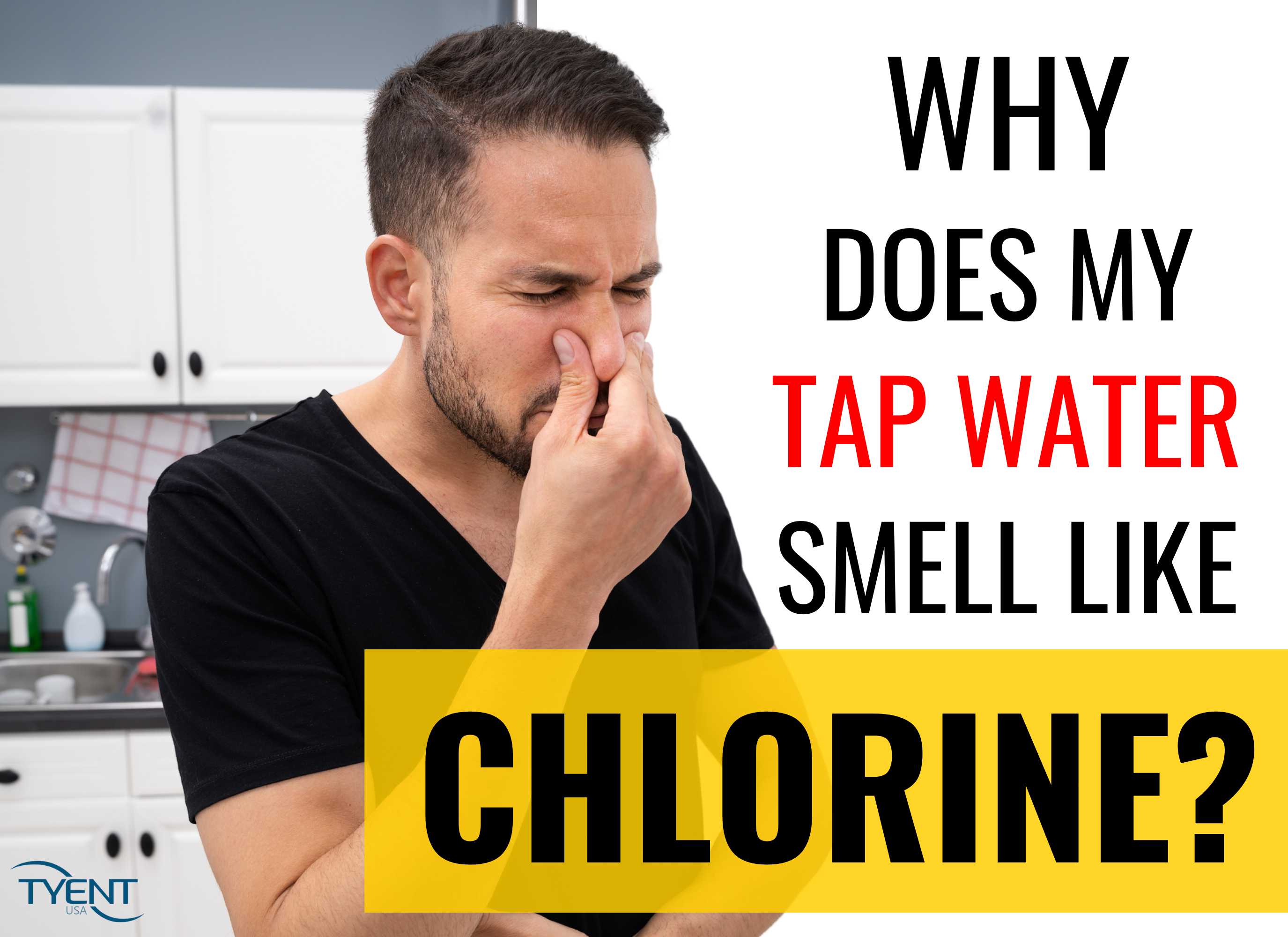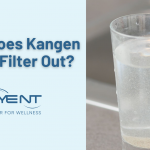The taste of chlorine in your water is unmistakable. No one wants to drink water that tastes of chlorine, but why does it taste that way? Most importantly, how do you stop your water from tasting like chlorine?

- Why Is Chlorine Added to Tap Water?
- How Does Chlorine Disinfect Tap Water?
- Is Chlorine in Water Harmful to Health?
- What Are Trihalomethanes?
- Is Food Cooked in Chlorinated Water Safe to Eat?
- How To Remove the Taste of Chlorine from Your Water
Why Is Chlorine Added to Tap Water?
First off, it sounds obvious, but the reason your water tastes of chlorine is because chlorine is in your drinking water!
Chlorine is a disinfectant, deliberately added to municipal drinking water to reduce the risk of germs such as Campylobacter, norovirus and Salmonella infecting the tap water. Before the practice of adding chlorine to water became commonplace, people were at risk of contracting diseases such as typhoid, dysentery and cholera. Disease rates in most of the population were dramatically reduced after chlorine was added to public water systems.
How Does Chlorine Disinfect Tap Water?
Chlorine will tackle most viruses and microorganisms, but not quite all. It also cannot touch other types of serious toxic contaminants – lead, for example.
People talk about how Chlorine ‘purifies’ water, and it is true that chlorination of drinking water neutralizes pathogens at a molecular level, by breaking the proteins present in the cell structure of the various bacterium.
Is Chlorine in Water Harmful to Health?
The subject of whether chlorine is harmful to human health is a live debate that’s been rumbling on for a few years now. The official word from the Centers for Disease Control and Prevention (CDC) is blandly reassuring:
“Chlorination is the process of adding chlorine to drinking water to kill parasites, bacteria, and viruses…. Using or drinking water with small amounts of chlorine does not cause harmful health effects and provides protection against waterborne disease outbreaks.”
Centers for Disease Control and Prevention (CDC)
However, while water companies are tasked with carefully monitoring the levels of chlorine in tap water, there is a growing school of thought that the practice of continually chlorinating tap water is not without risk to human health.
Ironically, those risks come into existence with the bringing together of chlorine and water particles. Chlorine can react with the microscopic organisms present in tap water, which leads to the formation of a carcinogenic substance called trihalomethanes.
What Are Trihalomethanes?
Elevated levels of trihalomethanes (THMs) – including chloroform – are linked to serious illnesses, including:
- Bladder cancer
- Rectal and colon cancer
- Adverse developmental effects
- Complications during pregnancy.
Is Food Cooked in Chlorinated Water Safe to Eat?
Generally speaking, yes. If the chlorine taste doesn’t bother you, then the amount of chlorine you ingest through food is likely to be within safe limits.
However, there are exceptions. A notable one is pasta cooked in boiling, chlorinated water that has been seasoned with iodized salt (salt to which a form of iodine has been added, a widespread practice). This simple, everyday cooking process can trigger the formation of ‘iodinated disinfection byproducts’ (iodo-DBPs). Long-term exposure to these compounds is linked to various forms of cancer.
How To Remove the Taste of Chlorine from Your Water
Tricky, isn’t it? Chlorine is added to water to kill viruses but ends up reacting with the water it’s supposed to be cleaning up and introduces a new risk factor simply by being there.
And of course, aside from all of that, Chlorine tastes really bad. Who wants to drink something that smells like that?
Boiling water for a length of time will remove the majority of ‘free’ chlorine, but it will not remove chlorine that has combined with other chemicals in the water. It will also not remove chloramine. It’s also worth bearing in mind that when you boil water, you reduce its quantity. Any other toxic contaminants in the water that cannot be removed by boiling will therefore become more concentrated.
The answer is to remove the chlorine present in your water. So, what’s the best way to do that?
Jug Filters
Most jug filters will take away the taste of chlorine, but of course, chlorine doesn’t exist in isolation: there are any number of unwanted and potentially dangerous toxins in your water, and jug filters are very rarely equipped to tackle them.
Distillation & Reverse Osmosis
Distillation and reverse osmosis will remove chlorine and pretty much every other contaminant in your water, but there’s a heavy price to pay here. Both methods of cleaning up water strip every mineral from the water, leaving it ‘dead’ and unstable. Fine for a short-term fix, but definitely not a long-term drinking water solution.
Water Ionizer
A Tyent water ionizer works by filtering and ionizing the water from your tap. Your regular water flows into the water ionizer unit, where it is cleaned by our award-winning filters, before flowing over and around powerful, electrically charged plates. This process is called ionization.
Ionization splits the water into two streams – acidic and alkaline. You cannot drink acidic water, but it is an essential item around the home, and also as a beauty product. Tyent alkaline water, however, tastes delicious! It is infused with minerals and naturally occurring molecular hydrogen, which energizes every cell in your body, while you hydrate!
Tyent ACE-13 Water Ionizer Voted the Best Machine of 2023
Choosing Tyent when you buy a water ionizer just got even easier! WaterFilterCast, the well-established hub of industry experts and clean water specialists just voted the Tyent ACE-13 Water Ionizer the best ionizer machine of 2023.
We’re proud of our place at the forefront of the water ionizer industry and as the No 1 brand across the internet, and we’re very happy to receive this accolade from such a trusted consumer and commercial resource.
FREE Water Report!
Have you had enough of the taste of chlorine in your water and your cooking? Start by grabbing your FREE water report to see exactly what’s in your tap water. Then call up our friendly team to talk about the amazing water ionizer deals we can offer right now!




